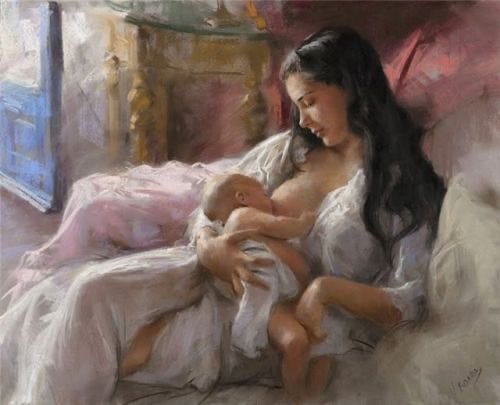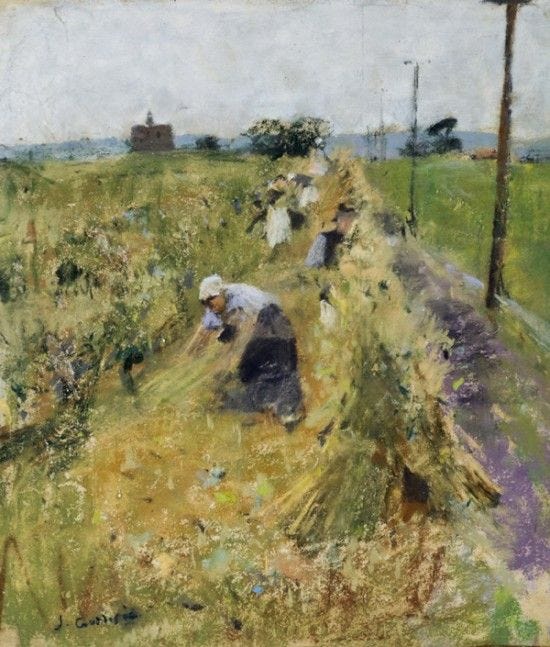Motherhood is having a bit of a moment. It feels like there are finally some conversations happening about both the positive and the negative aspects of motherhood.1 The emerging science of matrescence is looking in detail at the physical, emotional, social, and hormonal transformation that occurs when a woman becomes a mother.2 Celebrities are opening up about their experience of motherhood.3 The inequitable division of household labour amongst couples who both work full-time is under a renewed spotlight, partly thanks to Eve Rodsky’s smash hit bestseller Fair Play Life.4 “Tradwife” influencers, most famously Hannah Neeman, aka, Ballerina Farm, are showcasing motherhood in an aspirational and even, at times, glamorous light. Neeman alone has spawned article after article both defending and criticising her.5 Research into the “motherhood penalty” has added urgency to feminist calls for reforms to enable women to better balance work and motherhood.6
Conservatives voices urge women to prioritise their children and homes, or the domestic sphere, whilst feminists urge women to prioritise work and career, or the public sphere.
-
,
I think both sides highlight some important truths, and both are missing something. Those who sanitise motherhood and put it on a pedestal risk denying the humanity of being a mother, whilst those who demean and denigrate this sacred work as unimportant deny its divinity.
Because there is a paradox that exists at the heart of motherhood. Motherhood is where the transcendent and the mundane meet, where the sacred and the profane exist side by side. No one exemplifies this better than the Blessed Virgin Mary. As Theotokos, she is quite literally the Mother of God, yet she also went through the very human and universally female experiences of pregnancy and birth. She breast-fed the infant Jesus and rocked him to sleep. She held his hands as he took his first steps. Her very human womb was the first home of the fully divine, fully human Christ, the Word who became flesh.
So yes, motherhood is glorious and immanent and eternally significant. It is a source of joy that is hard to put into words, of deep and profound meaning. Yet it is also so often a brutal slog, menial task after menial task, relentless backbreaking labour that is so often unseen and unsung, only appreciated in its absence.
Motherhood is also often raw, and not at all pretty. It is cleaning poo out of your toddlers pants when they forget to use the potty.7 It is having a small human accompany you to the toilet for what feels like years on end. It is picking up the toys and books off the floor again, and again, and again. It is washing dishes, and folding laundry, and aching shoulders, and cracked nipples, and unbrushed hair. It is realising you haven’t had a full, unbroken night of sleep since before your first child was born. It is feeling so mentally and physically at your limit that you burst into tears because your Waitrose order sent minced beef instead of minced lamb and that tiny change is the straw that finally broke you.
Some days feel effortless - the baby naps for hours, the toddler doesn’t whine, I manage to bake and cook and clean and fit in some exercise, and it’s somehow almost easy, like I truly am made for this. On those days I feel semi divine, bursting with life and vitality.
Some days feel like a train wreck in slow motion, where every small thing that could possibly go wrong does, and I feel like I’m failing a million different ways all at the same time. There are tears all round - mine, the baby’s, the toddler’s, sometimes all three of us at the same time. Those days I struggle through till the children are both finally asleep and I can drag my aching body into bed.
Motherhood is demeaned and ignored by our culture, with mothers who choose to remain home with their children called “stay at home mothers”, a passive term. They are constantly compared with and pitted against the more active sounding “working mothers”. The truth is that childcare and homemaking is work, just as much as a paid job is work: stay at home mothers still work and working mothers are still homemakers.
You can’t put a price on motherhood. Modern feminists have made attempts to try and quantify the labour of mothers and put a monetary figure on it, with the idea that this might make our capitalistic society take it more seriously. Headlines like “the true cost of breastfeeding is $11,000 a year” can be charitably construed as an attempt to highlight the unpaid labour that so many women undertake, or uncharitably interpreted as a blatant propaganda piece that pushes formula as part of the solution to the domestic inequity that so many mothers struggle with.
I can understand why tradwife influencers seek to reclaim motherhood and make it beautiful. To infuse it with beauty and worth in a world that declares it to be superfluous and low status because it doesn’t come with a wage attached. I, too, believe that creating a home and raising children is a worthwhile and beautiful thing to do. These women are making motherhood an art, committing an act of defiance against an ugly and hostile culture. With their gingham aprons and perfect sourdough they proclaim “the domestic life can be beautiful and meaningful too”.
I can also understand the women who desire to make their presence felt in the world outside the home. Women, like men, have unique gifts and talents, and, like men, those gifts and talents are meant to be used. As a history graduate, I can’t buy into the idealisation of the historically atypical 1950s. Throughout history, most women have worked in some capacity alongside the work of childbearing and raising. In the pre-Industrial era, Europe and the newly-formed United States were primarily agrarian economies, and the lines between work and home were far more fluid. The division of labour was clearly gendered, but men and women laboured together, with most women able to work either within the confines of their homes, or within the near vicinity of their home.
I too, have creative dreams and aspirations. On the surface, I am far more aligned with the “tradwife” than with a modern career woman. My husband has a well paid corporate job and I am pretty much a full time SAHM mum. Having me at home with our children as much as possible whilst they are young is something we both think is important, and have both made sacrifices in order to facilitate. Pretty ‘trad’ I guess! And yet, I have a university degree. I married relatively late at 29, having spent much of my 20s pursuing my own interests, particularly travelling widely and frequently. I do, in fact, run a small business and am not technically a full-time homemaker. My husband is a very involved and hands on dad. He does more household cleaning than me, cosleeps with our toddler, does her bedtime routine 95% of the time, gets her up and dressed and fed in the morning, and is generally engaged emotionally and practically, both in our kids lives, and in the work of the home. So, maybe not so trad after all!
Motherhood can so often feel like a battle, a battle between the needs of your home and family, and your own needs as a person. I know that many things about modern life can exacerbate this, but also…maybe it’s meant to be a bit like that, maybe that is a feature not a bug? Maybe it’s less about battling to resolve these tensions and more about finding a balance that honours both needs?
Like I said in my ‘about me’ post, I have more questions than answers, but I would love to hear your thoughts on this. Is motherhood a paradox? Do we need to ‘solve’ this paradox or should we just embrace the inherent tensions that exist at the heart of motherhood? How have you found a balance between these tensions in your own motherhood experience? Let me know in the comments!
As always, if you enjoyed this piece then please share and subscribe. You can also support my work by donating on Buy Me A Coffee :)
See Matrescence: On the Metamorphosis of Pregnancy, Childbirth and Motherhood by Lucy Jones https://www.penguin.co.uk/books/443864/matrescence-by-jones-lucy/9781802061307
“Tired of being the “she-fault” parent responsible for all aspects of her busy household, Eve Rodsky counted up all the unpaid, invisible work she was doing for her family—and then sent that list to her husband, asking for things to change. His response was . . . underwhelming. Rodsky realized that simply identifying the issue of unequal labor on the home front wasn’t enough: She needed a solution to this universal problem. Her sanity, identity, career, and marriage depended on it.” I’m halfway through this book and have found myself agreeing with a lot of what Rodsky says. I’m grateful for the way she describes the unending work of the home in vivid and granular detail, and for her insistence that “all time is created equal.”
See: https://www.glamour.com/story/why-does-ballerina-farm-make-moms-so-mad; https://www.eviemagazine.com/post/ballerina-farm-hannah-neeleman-spoke-at-my-school-their-story; https://www.theguardian.com/commentisfree/2024/feb/04/sometimes-i-long-for-the-life-of-a-tradwife-then-i-remember-its-a-reactionary-fantasy; Neeman was even profiled by the New York Times here.
The ‘motherhood penalty’ is the earnings gap that exists between women with children who work, and women who don’t have children. Most researchers agree that this gap is actually bigger than the ‘gender pay gap’. https://www.sciencedirect.com/science/article/pii/S0049089X20300144
This happened to me this morning so it’s on my mind right now







I really enjoyed your explorations within this piece, Becca. Give me a decade more of motherhood and I might have completely different thoughts in response, but recently I've been wondering how much of motherhood being perceived as paradox comes from so many of us carrying deep notions of how the world works that ONLY apply to specific stages of life or specific experiences, rather than carrying us through from girlhood to womanhood and then motherhood (and elderhood). Could it be that the paradox simply arises where we need greater vision, or an understanding that encompasses more of reality than what we've so far perceived?
Beautiful reflection, Becca!
I think paradoxes like that of motherhood do not need to be solved and are rather an “icon” of the many paradoxes at the heart of God (Jesus being fully God and fully human, born of a virgin, the bodily resurrection, etc etc).
Along those lines, how I am trying to grow more comfortable with that tension is by leaning into the otherworldliness of Christian faith.
We’re supposed to renew and transform our minds by the power of the Holy Spirit, not being conformed to this world. And so I’m learning to get more comfortable with not needing to fit into a box or satisfy the expectations of society.
I hope that by doing so I will show my daughters that their worth does not come from what others think of them but from living the life that God wants for them as well as from His fatherly love for them. When we are worried about what others think of us, it also keeps us from truly loving them. I hope that by untethering myself from society’s expectations, and conforming to God’s expectations, I am increasing my own internal freedom and that of my family.